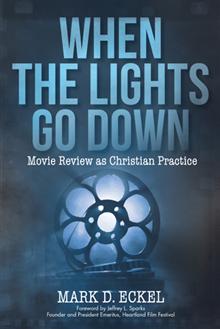

Our favorite movies tell us who we are and why we are.
Reflection
Hollywood Video had been my apologetic-evangelistic headquarters for years. Relationships developed there turned into friendships, which turned into opportunities for the gospel. Because of our common interest, my thoughts were always wrapped around and through film. One manager had been “taught something about the rapture” when he was a kid and asked my point of view on the horror genre, which made him uneasy about his future. We talked for half an hour. He listened attentively to my interconnection between Revelation and Hollywood.
I stood outside the store one afternoon as another manager smoked her lunch, asking me questions about my beliefs. When I told her that I saw my beliefs within the films in her store, her amazement was palpable. “Why don’t you write reviews for the store?” So I did. In fact, for some time, they kept a folder on the counter labeled “Dr. Eckel’s Reviews” for people who had questions about various films. None of my reviews contained John 3:16, but every one of my reviews encouraged people to look up.
Casual conversations at the video store inevitably led to the question “Have you seen ____?” Many of us reference movies on a regular basis. It is not that we have nothing else to do, but the action on screen often replicates action on the street. What we see in our own relationships, we see retold through actors. Our hopes and dreams, our fantasies and realities, our nonfiction and science-fiction, our love stories, and justice tales all point back to thoughts, emotions, and actions we live every day. Movies of all kinds depend on truth and sometimes teach truth, evidenced in a few one-sentence reviews.
- Love Actually and About Time advise us that love is not only possible but beneficial.
- Snitch asks, “What would you do to save your son?”
- Gimme Shelter prompts us not to forget, not to ignore, not to neglect those who cannot help themselves.
- Olympus Has Fallen believes the individual can make a difference, national security matters, and American government is worth saving.
- Thor, The Avengers, and Superman superhero movies invigorate us toward good but still leave us thinking, I need outside help.
- The Family Man reminds us that choices depend not on external attraction but internal change.
- Fruitville Station shouts unconscious prejudice consciously kills.
- Planes, Cars, or Monsters, Inc. teach the same lessons at age five or fifty-five: living necessitates dreams, friends, and acceptance.
- The Internship shows teamwork is imperative, pride comes before a fall, and the ultimate concern for every individual is “Can I accept how I was made?”
- Insidious and Insidious II scare us yet make us crave an understanding of the spirit world, knowing there is something else out there.
- Europa Report engages our thrill of discovery and our horror of discovering something we did not want to find.
- The Ultimate Gift could lead us to The Ultimate Life, causing our lives to be a gift to others.
- Elysium might engage health care or inequality discussions, if our interest is to see current political debate intertwined with our movies.
- Conspiracy theories or paranoia might be a reminder that we do not always know what is going on behind closed doors or Closed Circuit cameras.
- The Butler or 12 Years a Slave shout that justice will never be out-of-date.
- Tyler Perry’s Madea movies leave us in stitches, while pointing out the frayed threads of life.
- Captain Phillips shows us the face of leadership staring in the face of uncertainty and death.
- Enough Said asks, “Do we allow other people’s perspectives to become our own?”
- Prisoners. Any father who loves his children will feel every anguished moment of this film.
- Redemption. Can one person find emancipation by sacrificing himself for another?
- All Is Lost. We enter a life, near the end of a life, where life becomes more precious, since life is all we have.
- Arbitrage. Cold and calculating, a business man tries to extract himself from a self-made mess, while harming both finances and family.
- Thin Ice. Comeuppance equals just deserts, and the dessert is not always sweet.
I will never forget one particular day when I entered the store with a one-page review in hand. I asked the new worker behind the counter for the manager. “She’s out. Can I give her a message?” Afraid that the piece of paper would be misplaced by someone I didn’t know, I offered that I would wait and look through the new releases. As I turned to go, she asked with great hesitation, “Is that one of your reviews?” I didn’t know her, but she knew me. “I sure would like to read it. I promise to place it in the folder when I’m finished.” She handled the review as if she had just received the Holy Grail.
My search is not for “the grail” but for truth. Movies still move me. I am not alone. Movie makers take in hundreds of millions of dollars each year. Netflix, Redbox, and Amazon Prime are all indicative of the same idea: people love to watch movies. Our love for movies and the truths they tell can show our love for God by loving our neighbor.[1]
Questions
- In movies: Is evil portrayed as offensive and inappropriate or glorified as acceptable? Is evil critiqued as reprehensible or disgusting within the movie’s argument?
- Is evil condemned by the conclusion of the film or by the main character? Is a “good” alternative offered as a response to evil?
- Does the movie acknowledge the best example of moral persuasion? Are the results of immorality clearly identified and vilified?
- Is the cost of immorality and morality weighed? Do character choices within the story show clear alternatives of behavior or an outside source of ethics as the final solution?
- Is the movie goer led to an increased awareness of the human condition and its need for redemption? Is redemption understood as a necessity or corrective?
Prayer
Dear Lord. May you help us help others find encouragement in movies knowing that the ideas in film are rooted in the ideal found in heaven. May we find our standard of righteousness in you before we look for justice in the world. And may we enjoy the good in life because the good God has made all things. Amen.
Resource

Mark D. Eckel. When the Lights Go Down: Movie Review as Christian Practice. (Westbow, 2014).
[1] Taken from “Introduction” in Mark Eckel’s book When the Lights Go Down.
Editor’s note: The third piece in a five part movies series. If you’d enjoy the opportunity to write a review of a movie’s portrayal of higher education, interaction with an important topic with which you are familiar due to your studies/research, and/or value to your campus fellowship (due to a movie night, discussion group, etc.), please drop Thomas B. Grosh IV (Associate Director of the Emerging Scholars Network) a note. He’s very interested in hearing from you this summer 🙂
Dr. Mark Eckel is adjunct professor for various institutions, President of The Comenius Institute (website), spends time with Christian young people in public university (1 minute video), hosts a weekly radio program with diverse groups of guests (1 minute video), interprets culture from a Christian vantage point (1 minute video), teaches weekly at his church (video) and writes weekly at his website warpandwoof.org.

Leave a Reply